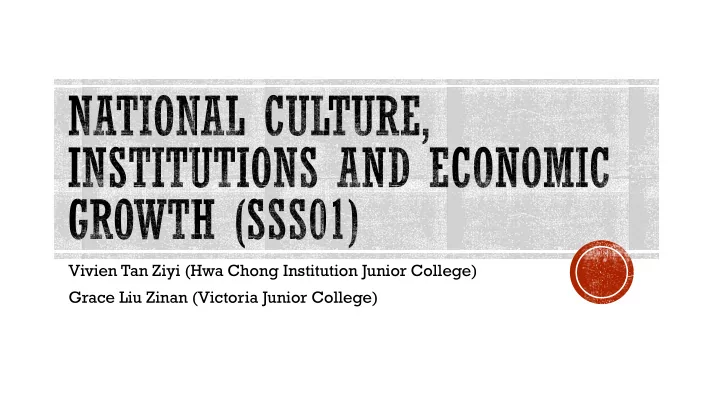

Vivien Tan Ziyi (Hwa Chong Institution Junior College) Grace Liu Zinan (Victoria Junior College)
Research : Uses within-country variation at the regional level to explore the link Historical institutions → culture → economic development Conclusion : Cultural differences are important as they bring about the different functioning of the same formal institutions
Generalized trust : Values, attitudes or social norms that produce trust towards those the respondent does not know when certain conditions are met Source of data : World Values Survey GDP year 2000 2005 2010 Correlation coefficient 0.502532704 0.446180905 0.483388746
Religiosity : Degree of religious involvement of a person Source of data : World Values Survey GDP year 2000 2005 2010 Correlation coefficient -0.349768526 -0.370306705 -0.402877631
Individualism : Emphasis on personal achievement and freedom, awarding social status to personal accomplishments Source of data : World Development Indicators GDP year 2000 2005 2010 Correlation coefficient 0.559875753 0.561832229 0.5981096
1. Formal institutions play a more significant role in economic development in OECD countries 2. Informal institutions play a more significant role in economic development in non-OECD countries
Individualism : Medium correlation coefficient Trust : Medium correlation coefficient Religiosity : Low correlation coefficient Formal institutions : High correlation coefficient
Formal Institutions (More Significant) Informal Institutions (Less Significant) OECD countries : Individualism: Medium correlation coefficient Economically developed Innovation stemming from individualism Well-developed formal institutions affects economic growth to a lesser extent Market economies highly dependent than policies introduced by formal on formal institutions to function institutions through frameworks & reforms Trust: Formal institutions: Medium correlation coefficient High correlation coefficient OECD study revealed trust is deteriorating in many OECD countries, progressively Ingrained into systems (e.g. weakening its correlation coefficient to Government, laws and regulations) economic growth Dictate runnings of economic system Religiosity: Low correlation coefficient Pew Research Center: Weak religious commitment in OECD countries → Weak effect on behavior → Not driving factor of economic growth
Individualism : High correlation coefficient Trust : Low correlation coefficient Religiosity : Medium correlation coefficient Formal institutions : Low correlation coefficient
Formal Institutions (Less Significant) Informal Institutions (More Significant) Non-OECD countries: Individualism: Developing countries High correlation coefficient Non-OECD countries: Many live in poverty Weak formal institutions in developing nation → Individualism drives innovation to break cycle of poverty Formal institutions: → Drives economic growth Low Correlation Coefficient Trust: No effective function → Lack of Low correlation coefficient policies to drive economic growth Low level of trust in nation and governing Corruption and lack of strong judicial body due to weak governing body → Not system → Distrust of system → Failure driving factor of economic growth of policies to promote economic growth Religiosity: Medium correlation coefficient Pew Research Center (2018): Developing country → Large proportion of religious people → Religion has a great effect on behaviors and economic transactions → Driving force of economic growth
1.Formal institutions play a more significant role in economic development in OECD countries 2.Informal institutions play a more significant role in economic development in non-OECD countries
Recommend
More recommend